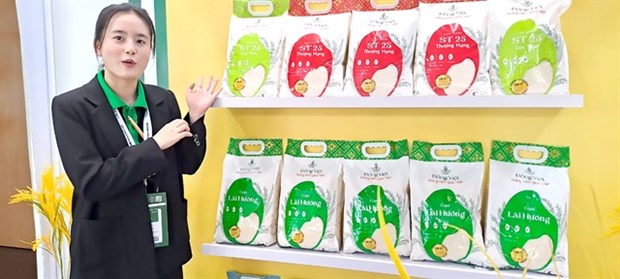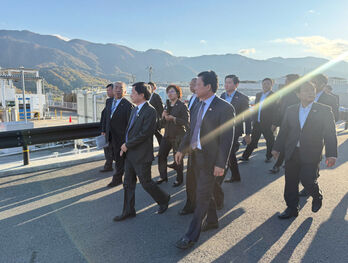
A staff member introduces Vietnamese rice products at the Rice News Convention at Ariyana International Convention Centre in Da Nang city. (Photo: VNA)
Nam said Vietnam’s rice export hit a record 8.3 million tonnes in 2023, the highest volume since the country started exporting rice in 1989, of which the percentage of high value and speciality rice was increased, earning 4.7 billion USD, a 38.4% increase in value from last year.
“Asia is seen as a major market share of our rice export, but America, Europe, the Middle East and Australia have emerged as new importers of Việt Nam’s rice in recent year. The Philippines became the largest importer when it took a 34% share (2.87 million tonnes) of Vietnam’s rice export turn-over in 2023,” Nam said at a panel discussion.
“The rice brands ST24, ST25, Jasmin 85, Japonica and sticky rice have become key leading products in the export growth in 2019-23."
He said Indonesia outclassed China as the second largest importer of Vietnam rice after the Philippines, while Malaysia, Japan, Germany and Sweden added to the list of new importers.
Pham Dat, a business manager of Amprotek, an inspection and analysing company in HCM City, said Vietnam’s rice has gradually penetrated the Philippines in the recent three years, accounting for 80% of rice import turnover.
She said previously, Thailand provided 90% of rice import for the Philippines, but Vietnam has now occupied 80% of the Filipino rice market.
“Rice of Vietnam is a favourite product for Philippines consumers in terms of competitive price and quality. New varieties were grown, with advanced technology used in farming, processing and post-harvest,” Dat said.
“An average price of 650 USD per tonne offers a smooth advantage for Vietnam’s rice to access selective markets. Marketing solutions have been approaching closer to consumers’ needs in different markets, helping Việt Nam’s rice earn a successful market share in stiff competition,” she said.
Although exporting to 54 countries over the world, rice of Vietnam has still been struggling to reduce input costs and loss ratio during processing and storage to gain better advantage in market occupation.
“It requires more active marketing action and joint solutions from Vietnamese farmers, exporters and policy-makers in creating the best way for rice export. Investment and support policies in post-harvest technology and bank loans are still limited,” she explained.
She said some rice producers have introduced varieties, such as red rice and premium long grain, that help draw health-conscious customers.
Desh Ratna, Southeast Asia regional head of Valency International, an international commodity trading house, said Vietnam’s rice quality has been improved recently, and the rice export market is expected to increase in the coming time as India has banned exporting rice.
He said Vietnam and Thailand have opportunities to expand market share in the absence of India, a big competitor in the world rice market.
Le Anh Nam, head of rice export division of Tan Long Group, said investment in technology, market access and premium production would help local companies expand added value and sustainable growth.
He said the group earned about 120 million USD for exporting 200,000 tonnes last year, and it expects to increase to 300,000 tonnes in 2024.
“We invested 70 million USD in a Europe-based fully automatic Hanh Phuc Rice Mill, the largest such facility in Asia, for processing a maximum 240,000-tonne storage capacity. The group also uses a cooling system to store grain for year-around production,” Nam said.
“The group operates a system of 60 rice mills nationwide to meet the 2024 target. We plan to export 1,500 tonnes of the premium rice to Japan where the price is 50 USD higher than an average export value of other rice products,” he shared.
Rice News Convention, organised for the first time in Vietnam, is a brand-new initiative by the SS Rice News team among efforts to build a network of rice market participants tuned to the latest developments in the global rice market.
Organisers of the convention said it aims to bring together all elements of the global rice market, from farm to fork, with the event's primary aim to bring industry participants from across the supply chain supporting the world rice trade for the opportunity to gain insights on market developments, and understand the risks and opportunities from an event that aims to build a better awareness as well as to improve communications within the rice trading community.
The Vietnam Food Association unveiled at the convention that Vietnam would produce 43.5 million tonnes of rice in 2024, of which more than 7 million tonnes are for export, for revenue of 5.3 billion USD./.
VNA
Source: https://en.vietnamplus.vn/vietnams-rice-looks-for-high-value-export/282597.vnp
 Tay Ninh learns about Hydrogen production model in Japan
Tay Ninh learns about Hydrogen production model in Japan



